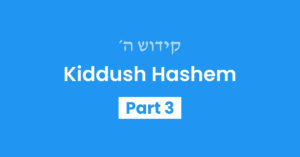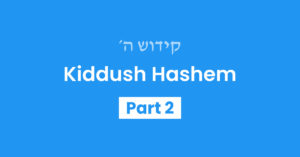We have just entered the hebrew month of Tammuz. Soon will be the 17th of Tammuz, the beginning of the Three Weeks, when we will mourn the destruction of the Beis Hamikdash and yearn for Mashiach to come.
Although we daven for Mashiach all the time, even multiples times a day in our tefillos, it can sometimes feel hard to relate to the pain of the destruction of the Beis Hamikdash. We know intellectually that we are in Galus now, but do we really feel like we are in exile? Do we really feel the pain of Galus?
Imagine a man named Chaim who seems to have a perfect life. He has a wonderful wife, many healthy and happy children, and a fantastic job. He lives in a comfortable house with a beautiful backyard, and enjoys a fabulous reputation in his community as a mentsch, a ben Torah, and a big Baal Tzeddakah.
Is there anything missing in Chaim’s life? Why should Chaim yearn for Mashiach, if his life is perfectly fine right now?
Identifying With Hashem’s Pain
In order to understand this question, we need to take a step back and look at the world from a global perspective (as we often do in Middos Challenges!).
Life is not just about me, my job/school/hobbies, and what I ate for lunch. Rather, life is about every individual person helping the world move closer to its ultimate purpose. I did not earn my right to exist, and I did not choose to be born. Rather, I was created by Hashem, Who created me for a specific purpose. It clearly follows, then, that my entire life must be devoted to fulfillig that purpose.
What is that purpose? Hashem tells us straight out: “Kol HaNikra ViSh’mi V’Lichvodi Birasiv…”1 Everything in this world was created for the sake of Kavod Shamayim, giving honor to Hashem…. and how do we give Hashem honor? The same way that a human king is honored. Just as a human king is honored when his subjects recognize his kingship and hurry to fulfill his wishes, we can give honor to Hashem by recognizing Him as our Creator and committing ourselves to fulfilling His commands. Every time we do a mitzvah or acknowledge Hashem’s presence, it gives honor to Hashem and brings the world closer to fulfilling its ultimate purpose.
Every time we do a mitzvah or acknowledge Hashem’s presence, it gives honor to Hashem and brings the world closer to fulfilling its ultimate purpose.
Re-Evaluating Our Definition of “A Good Life”
Now that we have shifted our focus to remember the global purpose of this world, we will naturally come to define “success” in an entirely different way. If the entire purpose of our lives is to give honor to Hashem, then a “good life” must be measured according to how much Hashem’s presence is being recognized and honored in this world.
How much is Hashem honored in the world right now? Well, on the good side, there are thousands upon thousands of frum Jews around the world who wake up and say Modeh Ani every morning, and do countless other mitzvos throughout the day. Every mitzvah brings an increased awareness of Hashem into this world and makes a kiddush Hashem.
But aside from all the Jews and righteous gentiles who fulfill Hashem’s will, what does the rest of the world look like? Unfortunately, the painful reality is that there are still far too many places where Hashem’s Presence is hidden or disgraced on this earth.
There are still far too many places where Hashem’s Presence is hidden or disgraced on this earth.
The world is full of atheists who deny Hashem’s existence on a daily basis. Not only that, but many people are living corrupt lifestyles or publicizing corrupt ideas. Israel is constantly under attack, and the Jewish people – Hashem’s treasured nation – cannot live safely and comfortably in their homeland. Numerous Jewish children and adults are “off the derech” and transgressing Hashem’s commandments every day.
For as long as we are in Galus, the world is still far, far away from the ideal state for which it was created.
For as long as we are in Galus, the world is still far, far away from the ideal state for which it was created.
Going back to our theoretical man named Chaim above – even if Chaim’s personal life seems perfect – with his wonderful wife, children, house, and job – there is still a tremendous amount missing from his world. The world, as a whole, is still aching in pain.
The world, as a whole, is still aching in pain.
This is why we daven for the Geulah so many times a day, and Jews throughout the centuries have gotten up at midnight to say Tikkun Chatzos. For as long as we are in Galus, Hashem’s presence is hidden and cannot be fully revealed in this world. Hashem cannot reign as the honorable King that He is supposed to be.
We daven for the Geulah because when Mashiach will finally come, only then will the entire world achieve its ultimate purpose of recognizing Hashem as our Creator. Only then will Hashem’s Presence be finally revealed, as it says, “Ki Mal’ah HaAretz Dei’ah es Hashem Kamayim Layam Michasim – [At the time of Redemption], the entire earth will be filled with knowledge of Hashem, like water that fully covers the depths of the sea.”2
This week, let’s practice shifting our minds to have this global perspective. Let’s remember that no matter how comfortable any individual person’s life is, the world as a whole is still far from perfect because Hashem’s Presence is not fully revealed and recognized. Let’s hope that in the merit of our yearning for Mashiach and yearning for Hashem’s presence to be fully revealed, Hashem will finally bring our Ultimate Redemption and help the world realize the ultimate purpose for which it was created.3
Sources: [1] Yeshaya 43:7; [2] Yeshaya 11:9; [3] See Michtav Mei’Eliyahu Vol 2 pg. 47;
Your Challenge
Once a day, ask Hashem to bring Mashiach so that His Presence can finally be revealed in this world and everyone will recognize Him as our King.
You can daven for this in your own words, or you can just have kavannah while saying something in davening that is related to this concept.
FOR EXAMPLE:
- ולירושלים עירך ברחמים תשוב
- יהא שמיה רבה מברך לעולם ולעלמי עלמיא
- יהי שם ה׳ מברך מעתה ועד עולם
- צור ישראל קומה בעזרת ישראל ופדה כנאומך יהודה וישראל
- תקע בשופר גדול לחירותינו
- ראה בענינו וריבה ריבינו וגאלינו מהרה למען שמך
- רצה… והשב את העבודה לדביר ביתיך
- ותחזינה עינינו בשובך לציון ברחמים
- יהי רצון… שיבנה בית המקדש במהרה בימינו
- על כן נקוה לך… להעביר גילולים מן הארץ… לתקן עולם במלכות שקי
- ובנה ירושלים עיר הקודש במהרה בימינו
Torah Questions
- When did Avraham Avinu make a big Kiddush Hashem by being prepared to give up his life rather than serve idols? (See Rashi on Bereishis 11:28 or Ramban on Shemos 20:6)
- Who tried to follow in Avram’s footsteps, but failed? (See Rashi on Bereishis 11:28)
- According to the Ramban on Vayikra 22:32, what is the reason for why every Jew is obligated to make a Kiddush Hashem?
- The Gemara (Yoma 86a) says that most sins can be rectified through Teshuva and Yom Kippur, but if a person makes a Chillul Hashem, the only way to rectify it is through _____.
Questions to Ponder
- Rabbeinu Bachaye says that when it comes to the sin of Chillul Hashem, people often start small, and then it gets worse. Have you ever experienced this to be true? Have you ever seen yourself or someone else begin by disrespecting one small part of the Torah, and then ultimately end up disgracing much more serious things?
- Rabbeinu Bachaye says that although it’s bad for anyone to make a Chillul Hashem, it’s even worse when a Talmid Chochom makes a Chillul HaShem. Why do you think this is so?
- The Gemara says that even though Haman was an evil man, his descendants ended up converting to Judaism and learning Torah in Bnei Brak! The Sefer Chochmah U’Mussar explains that Haman received this reward simply for being the vehicle for bringing about a Kiddush Hashem in the Megillah. If not for Haman, we wouldn’t have the whole Purim story – the story of the miraculous salvation of the Jewish People, which made a big Kiddush Hashem. As a reward for being the cause of such a huge chillul Hashem, Haman was rewarded with having descendants who learned Torah.
Does this seem fair to you? How can we understand the fact that Hashem rewards people who play a role in making a Kiddush Hashem, even if the people themselves (Haman) are so evil?





